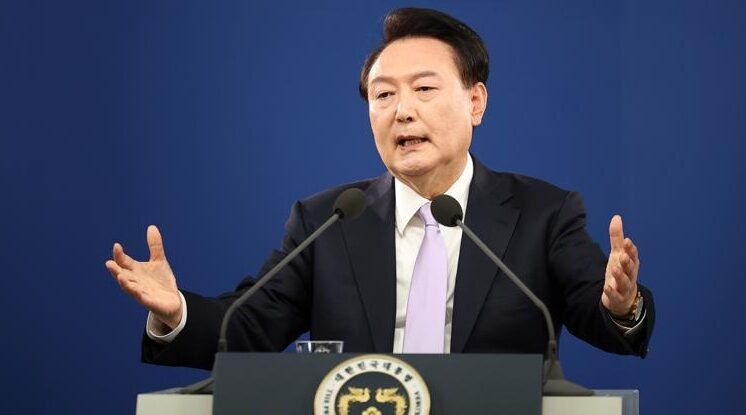
Political Tensions in South Korea: Impeachment Attempt Against President Yoon Suk Yeol Fails
In a highly contentious episode of South Korea’s political landscape, an opposition-led attempt to impeach President Yoon Suk Yeol over his controversial declaration of martial law failed to pass in the National Assembly on Saturday. The motion, which sought to hold President Yoon accountable for his short-lived and heavily criticized imposition of martial law, fell short of the two-thirds majority required for approval. This development highlights the deepening divisions within South Korea’s political arena and raises concerns about the nation’s governance stability.
Failure of the Impeachment Motion
The impeachment motion, introduced by opposition parties who hold 192 seats in the 300-member National Assembly, failed to achieve the necessary quorum due to a strategic boycott by the conservative governing People Power Party (PPP). Only three lawmakers from the PPP participated in the vote, leading to a total count of 195 votes, which was five votes shy of the required 200 to proceed with the motion.
Also Read: Trucking Injuries Attorney Houston: Seeking Justice After an Accident
National Assembly Speaker Woo Won-shik declared the vote invalid, stating:
“The number of members who voted did not reach the required two-thirds majority of the total members. Therefore, I declare that the vote on this matter is not valid.”
Without meeting the voting threshold, no ballot count took place, and the impeachment effort was dismissed. Parliamentary rules dictate that no new impeachment motion can be introduced until December 11, leaving the opposition with limited options in the immediate future.
Public Outcry and Political Fallout
The failure of the impeachment motion has sparked widespread outrage among South Koreans, many of whom have been protesting against President Yoon’s actions. A recent public opinion poll indicated that a majority of citizens supported the impeachment motion, underscoring growing dissatisfaction with the president’s handling of governance. The impeachment effort’s collapse is likely to intensify public demonstrations calling for Yoon’s resignation.
Criticism of Yoon’s decision to impose martial law has been harsh, even within his own party. The declaration, which was in effect only briefly, was widely condemned as a reckless and unnecessary move. Despite the backlash, the PPP has stood firmly against the impeachment effort, expressing concerns that Yoon’s removal could shift political power toward the liberal opposition.
Martial Law Declaration: A Flashpoint in South Korean Politics
President Yoon’s declaration of martial law marked a significant turning point in South Korea’s political climate. The decision to impose martial law last month was a dramatic and unprecedented action, causing alarm domestically and internationally. The sight of special forces encircling the parliament building and military helicopters overhead drew widespread criticism, even from allies such as the United States and Japan.
In an extraordinary parliamentary session, lawmakers from across party lines voted to overturn the martial law decree, forcing Yoon to rescind it before dawn the following day. This marked the first instance of martial law in South Korea in over 40 years, a move that many perceived as an alarming overreach of executive power.
The declaration, intended to address alleged threats to national security, instead exposed vulnerabilities in Yoon’s leadership and led to speculation about his ability to govern effectively. The president’s actions have been described as a “bizarre and poorly-thought-out stunt” that has left South Korea politically paralyzed and deeply divided.
Political Implications and the Road Ahead
The fallout from the failed impeachment attempt and the martial law declaration is expected to dominate South Korea’s political discourse in the coming months. The opposition is likely to intensify efforts to hold the president accountable through alternative means, including further investigations and public campaigns.
Within the PPP, divisions are becoming increasingly apparent. While the party officially opposed the impeachment motion, 18 of its members broke ranks last month to vote against Yoon’s martial law decree. This internal dissent indicates a growing rift within the ruling party, which could complicate its ability to maintain unity and public trust.
Also Read: The Aftermath: Houston Texas Truck Accident Attorney
Speculation is also growing about the president’s potential next moves. Some analysts suggest that Yoon might propose a constitutional amendment to shorten his presidential term as a way to quell public anger and avoid a prolonged political crisis. Such a move, however, would require bipartisan support and could face significant resistance from both the opposition and members of his own party.
Broader Implications for South Korea’s Democracy
South Korea’s democratic institutions have been tested in recent weeks, and the nation’s political stability remains uncertain. The failure of the impeachment motion underscores the challenges of navigating deeply polarized political waters, while the public’s response highlights a growing demand for accountability and transparency from its leaders.
The international community is closely watching these developments, particularly key allies like the United States and Japan, who value South Korea’s stability in the region. Any prolonged political turmoil could have implications for regional security and economic partnerships.
Conclusion
The failed impeachment attempt against President Yoon Suk Yeol represents a critical moment in South Korea’s modern political history. While the opposition’s efforts fell short this time, the political and public pressure on Yoon is unlikely to dissipate. As South Korea continues to grapple with the fallout from the martial law declaration, the nation faces significant challenges in restoring political stability, rebuilding public trust, and reaffirming its commitment to democratic principles.
In the weeks and months ahead, all eyes will remain on the National Assembly, the People Power Party, and President Yoon as they navigate the turbulent political waters of a divided South Korea.